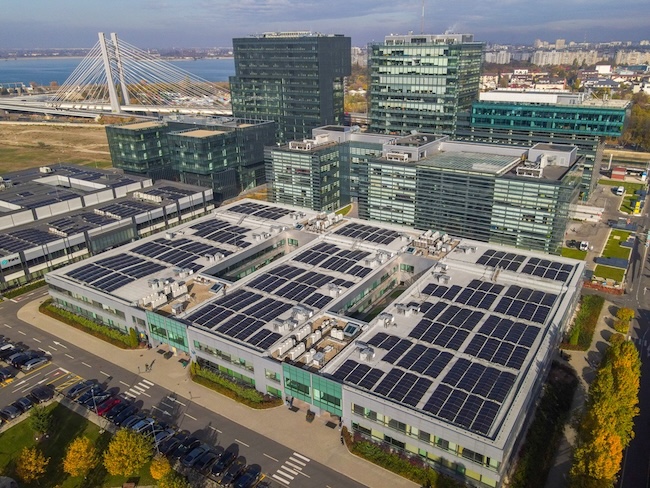Romania makes one step ahead towards net zero energy building

As of February 2023, new technical regulations regarding the methodology for calculating the energy performance of buildings will enter into force in Romania. Thus, the Romanian construction market will take an important step forward by aligning with European standards and trends in terms of sustainability.
The Official Gazette of Romania published, on January 17, the "Methodology for calculating the energy performance of buildings, indicative Mc 001-2022". Setting minimum performance requirements for existing buildings and new buildings with near-zero energy consumption (nZEB) is one of the requirements covered by the new Mc 001 regulation.
„The updated version of the Mc 001 regulation has been long awaited throughout the construction industry in Romania. nZEB standards are today an essential step for sustainable real estate development, especially now, when energy performance and solutions based on renewable energy, neutralization of the carbon footprint and reaching the targets imposed by the European Commission are a global priority" - states Răzvan Nica, Managing Director of BuildGreen.
The transition period to the new criteria mentioned in the Official Gazette is 180 days. In this time frame, designers as well as investors can study the revised minimum energy efficiency values and adjust the ongoing design phases accordingly to update the energy efficiency concept.
Some provisions - from the chapters "Thermal envelope of the building" and in the "Evaluation of energy consumption for installation systems without renewable sources" - will enter into force starting from July 2023.
"Regarding the energy consumption targets, the new methodology proposes more realistic values and also allows more flexibility in reaching the minimum renewable energy percentage requirements" - adds the BuildGreen representative.
The object of the regulation "Mc 001- Methodology for calculating the energy performance of buildings" is multiple and consists in particular of:
Assessment and certification of the energy performance of buildings for various categories of new and existing buildings – single-family/collective residential buildings, office buildings, educational buildings, hospitals, nurseries, polyclinics, hotels and restaurants, buildings for sports activities and buildings for services wholesale and retail trade, buildings with other uses and human occupation where at least heating, domestic hot water and lighting are provided, as well as for building units of all of them, including apartments;
Energy auditing of buildings to be modernized from an energy point of view;
Establishing minimum performance requirements for existing buildings and new buildings with near-zero energy consumption (nZEB);
Defining the measures and packages of common measures that can be applied to increase the energy performance of existing buildings/building units and establishing the way to quantify the costs associated with these measures;
Presentation of the minimum energy performance requirements for residential and non-residential, existing renovated buildings or for buildings whose energy consumption is close to zero.
Scope of the Mc 001 Methodology:
Evaluation and certification of the energy performance of existing and new buildings/building units, whose energy consumption is almost equal to zero (nZEB);
Evaluation and certification of the energy performance of the apartments;
The thermal and energy analysis, respectively the preparation of the energy audit of the existing buildings that are to be modernized from an energy point of view.
Currently, the calculation of the energy performance of buildings (existing or new developments) is carried out in relation to the nZEB standards imposed by the European Commission through the Directive on the energy performance of buildings of the European Parliament and the Council (details below) and involves the analysis of all aspects of the process construction and operation of the building including materials and technologies capable of ensuring energy efficiency and minimizing CO2 emissions.
With a 13-year history in sustainable development, BuildGreen conducts building energy efficiency monitoring, auditing and strategy projects for a wide range of real estate properties – existing or under development – with a strong focus on nZEB norms and carbon footprint neutralization.
Leader in the field of design, development and certification of sustainable buildings in Romania and one of the most active consultants in Central and Eastern Europe, BuildGreen operates in over 18 European countries and has been involved, in total, in the certification of over 350 real estate projects, with a cumulative area of over 8 million m2 and a total investment of over €10 billion.
About nZEB
The nZEB standard means that a building must have a very high energy performance. The near zero or very low amount of energy required should be covered to a very significant extent by energy from renewable sources. This includes energy from renewable sources produced directly onsite or nearby. The European Commission requires that EU countries have to ensure that all new buildings are nearly zero-energy through the Energy Performance of Buildings Directive currently undergoing new updates, in order to make a step forward from current NZEB to zero-emission building (ZEB).
In the long term, the European Commission intends to align the energy performance requirement for new buildings with the longer-term climate neutrality goal and the key principles of the EU energy policy.
From nZEB to ZEB
According to the directive’s proposal, a zero emission building is defined as a building with a very high energy performance, with the very low amount of energy still required fully covered by energy from renewable sources and without on-site carbon emissions from fossil fuels. The ZEB requirement should apply as of 1 January 2030 to all new buildings, and as of 1 January 2027 to all new buildings occupied or owned by public authorities.
While the focus of the proposal is the reduction of operational greenhouse gas emissions, ZEB definition further include the calculation life-cycle Global Warming Potential (GWP) and its disclosure through the energy performance certificate of the building. This requirement should apply as of 1 January 2027 for all new buildings with a usable floor area of more than 2000 sq.m. and as of 1 January 2030 for all new buildings.
In this context, the recent approval of Romania’s nZEB methodology is a major step ahead towards a set of very strong, ambitious and high sustainable building objectives across Europe.
„The methodology approved represents just the beginning of a new era in sustainable building. Carbon neutrality and renewable energy are todays main concern and the tools for the calculating and actually reaching the nZEB standards have been long awaited”- concludes Răzvan Nica, BuildGreen Managing Director.






